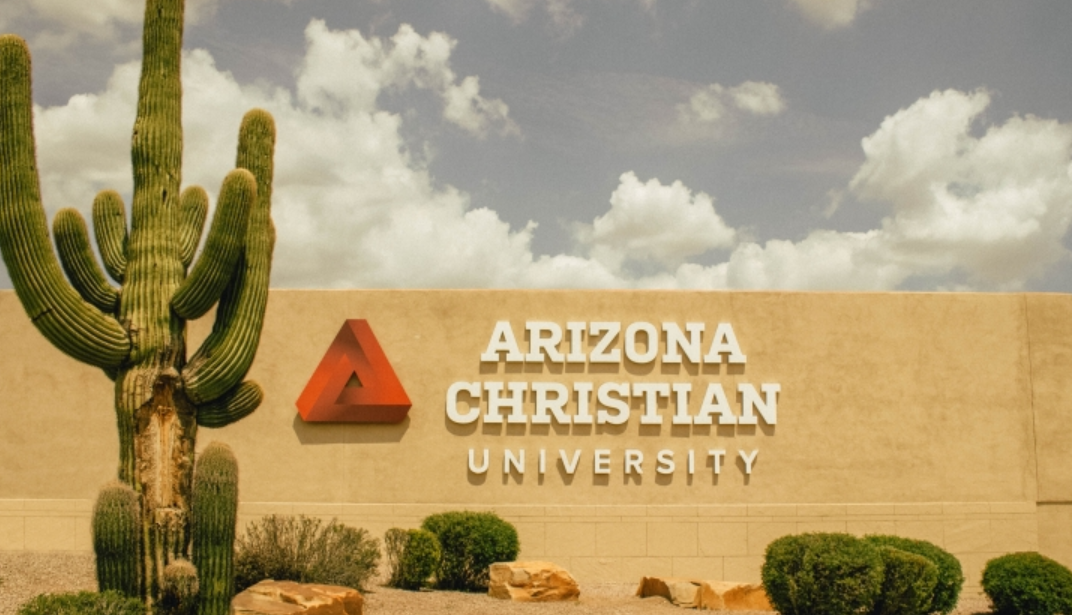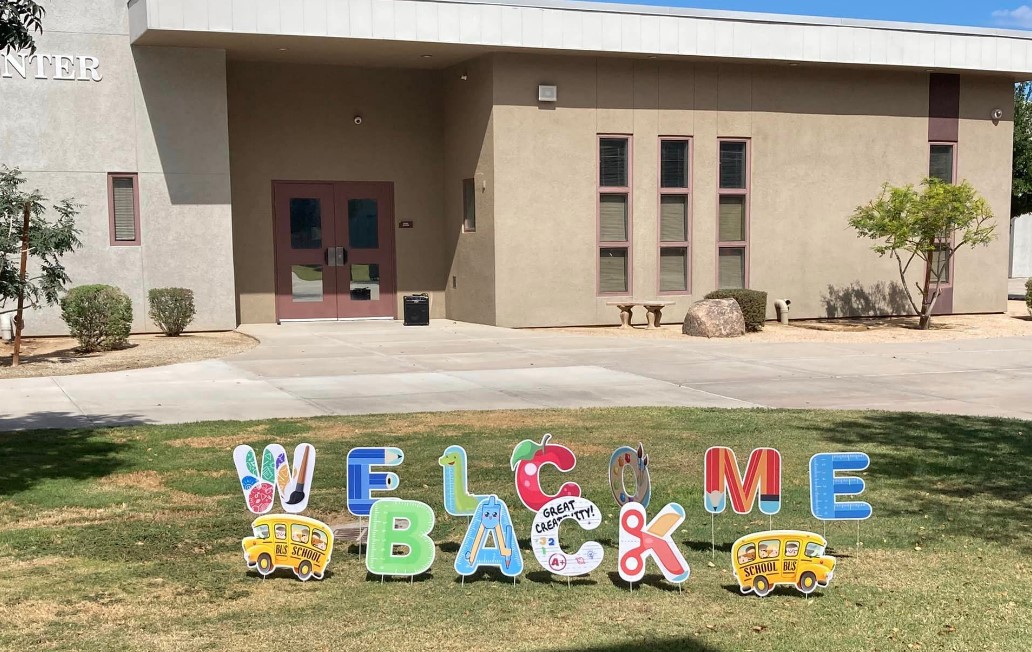
by Daniel Stefanski | Aug 24, 2023 | Education, News
By Daniel Stefanski |
On Tuesday, Arizona Christian University (ACU) announced that it had “achieved record enrollment and surpassed 1,200 total students for the first time.”
ACU President Len Munsil championed the news of his university’s enrollment prowess, saying, “As one of the few higher education institutions in the nation that is conservative and committed to biblical truth, we are finding more and more students and families are looking for what we are offering. For Christians who are tired of paying tuition to institutions where their faith is ridiculed, mocked and canceled, ACU is becoming an increasingly popular alternative.”
The release from ACU highlighted its blossoming recruitment and enrollment efforts, that have largely taken place since Munsil assumed control of the university in 2010, sharing, “After graduating its largest class ever in May, ACU is excited to welcome nearly 500 new students this fall, including nearly 400 first-time freshmen. ACU attracted more new students this year than its entire campus population during Munsil’s first year as ACU president in 2010. For the past decade, ACU has been one of the fastest-growing universities in America.”
Munsil shared his thoughts on ACU’s future and the importance of holding true to the university’s values and mission, adding, “Ultimately, we believe ACU will continue to grow – and must continue to grow – because of its conservative, biblical mission and uncompromising stand for the truths of the gospel. But that growth will never come at the expense of our mission – or our commitment to the small college experience and the unique, caring community we have developed.”
The new year for the university comes after a rather challenging spring, when ACU garnered media headlines over its legal battle with a local school district. In May, the Arizona-based Alliance Defending Freedom (ADF) announced a settlement between ACU and the Washington Elementary School District after the District “decided to terminate its (eleven-year) relationship with Arizona Christian and its students solely because of their religious status and beliefs on biblical marriage and sexuality.”
ADF revealed that “the district’s board voted…to enter a new agreement allowing ACU students to teach in the district once again” – in addition to covering $25,000 in attorneys’ fees. That motion from the District’s Governing Board passed with a 4-1 vote.
After the settlement was brokered, ACU and Munsil took a conciliatory approach to recognizing their legal victory. Munsil said at the time, “We look forward to a continued beneficial partnership that serves ACU student-teachers and the students, faculty, and staff of the WESD.”
According to the university, “ACU’s mission and vision are to transform culture with truth by educating and equipping Christian leaders of influence and excellence. Recent ACU graduates have gone on to excel in seminaries, prominent graduate schools, medical schools and law schools including Harvard, the University of Virginia, and ASU’s Sandra Day O’Connor College of Law. Other recent graduates have started businesses and non-profits, become teachers, counselors, worship leaders and pastors. ACU has continued to rise in U.S. News & World Report’s national ‘Best College’ rankings, including being ranked in the category of ‘Best Value’ due to its tuition being 25 percent lower than average for private colleges.”
Daniel Stefanski is a reporter for AZ Free News. You can send him news tips using this link.

by Corinne Murdock | Aug 24, 2023 | Education, News
By Corinne Murdock |
School choice is popular throughout Arizona across all party lines, according to a poll released by the Yes Every Kid Foundation (YEKF) earlier this month.
The poll reported that both parents and non-parents across all political parties support the Education Savings Account (ESA) Program. 78 percent of parents and 62 percent of non-parents support ESAs. 48 percent of Democrats, 61 percent of independents, and 78 percent of Republicans expressed support for school choice. Only 38 percent of Democrats opposed the ESA Program.
The poll also asked its respondents for their view of Gov. Katie Hobbs. 38 percent expressed an unfavorable view of the governor, with 34 percent expressing a favorable view and 20 percent expressing no opinion on the matter. The percentage of those who expressed an unfavorable view of the governor increased by 14 percent after pollsters told the respondents that Hobbs wanted to eliminate the ESA Program.
WPA Intelligence conducted the poll for YEKF.
YEKF is a Virgina-based 501(c)(3) nonprofit associated with its 501(c)(4) nonprofit counterpart, Yes Every Kid. Their director of policy operations, Whitney Marsh, has an extensive leadership background in Arizona.
Marsh was formerly the deputy chief of staff for former Arizona Department of Education (ADE) Superintendent Kathy Hoffman, from December 2019 to last April; executive director for the Arizona State Board for Charter Schools, vice president of education policy and budget for the Arizona Chamber of Commerce and Industry, and then director of strategic initiatives under the Arizona Board of Regents under former Gov. Doug Ducey; state policy director of K-12 funding for Foundation for Excellence in Education; and senior budget analyst for former Gov. Jan Brewer.
Several YEKF executives hail from the Koch Network: Director Andrew Clark; COO Erica Jedynak, also formerly the state director for Americans for Prosperity; Vice President of Strategy Matt Frendewey, also formerly a senior advisor to both former Secretary of Education Betsy DeVos and Gov. Jeb Bush’s Foundation for Excellence in Education.
In response to the poll, Arizona State Board of Education member and school choice proponent Jenny Clark criticized Hobbs’ opposition to the ESA Program.
“ESA approval in Arizona is popular across party lines,” said Clark. “Maybe Governor Hobbs will get a clue! Families want choices!”
Hobbs retracted a $50 million grant issued by her predecessor, Ducey, for the ESA Program in May. The funding was slated for day-long ESA Program kindergarten. Hobbs said the grant represented unequal treatment of ESA versus non-ESA students, since the state only funds half-day kindergarten for public school students.
Last month, Hobbs’ office issued a memo declaring that the ESA Program would bankrupt the state. ADE Superintendent Tom Horne countered with an independent analysis debunking Hobbs’ prediction.
Hobbs’ initial budget asked for a rollback of the universalized ESA Program. However, the governor ultimately compromised in the final form of the budget.
Corinne Murdock is a reporter for AZ Free News. Follow her latest on Twitter, or email tips to corinne@azfreenews.com.

by Daniel Stefanski | Aug 20, 2023 | Education, News
By Daniel Stefanski |
This week, Danielle Jordan made her second appearance before the Laveen School District Governing Board to call for action in her son’s case from earlier this spring. Jordan spoke for approximately thirty minutes after a member on the Board first indicated that she was only going to be allowed to give two minutes of public comments to address the circumstances surrounding her son – then reversed course after a private conversation with an attorney.
On April 25, Danielle’s ten-year-old son was allegedly confronted by a school official at Vista Del Sur Accelerated Academy in the Laveen Elementary School District. Video captured in a school office – and highlighted by other media reports – appears to show the school official on top of the young boy, holding him down. The footage purportedly shows at least one other person in the room with the boy and the school official, standing off to the side. The police were called to the school after the incident, and according to reports, the investigation may be ongoing.
According to reports, the alleged (and videoed) interaction between the boy and the school official happened after he was apparently told he was suspended from the school. Few details are publicly known about the catalyst for this suspension, and Danielle claims she had no advance notice of the disciplinary action against her son.
The Laveen School District has released a lengthy statement for this situation, calling what occurred on the fateful April day, an “improper restraint.” The District added, “In late April, a district-level administrator was asked to come to Vista Del Sur Accelerated Academy to help with a student. While the student was being escorted to the in-school detention room, the administrator perceived the student was trying to exit the campus. While trying to stop the student from leaving campus, the administrator applied an improper restraint technique by grabbing hold of the student’s arm and shoulder to prevent the student from doing so. The student struggled to pull away from the administrator and the two fell to the ground. While on the ground, the administrator leaned over the student for approximately 40 seconds in an effort to calm the student. When the student stood up, the student asked and was permitted to call the student’s mother.”
While Jordan was attempting to handle things diplomatically, she and her lawyer have escalated matters in the court of public opinion – and with local law enforcement. This week’s appearance before the Governing Board was Jordan’s second, and she also held a press conference to share her grievances with the perceived lack of action. Additionally, it was revealed that Jordan’s team sent a letter to Maricopa County Attorney Rachel Mitchell, requesting that her office step in for a potential criminal investigation.
Both sides have pointed blame at the other for a perceived lack of communication to remedy the wrong.
In the District’s statement and during the Governing Board meeting, the school official at the center of this controversy was cryptically referred to in past tense, but little information was shared by members as to why this individual suddenly became a “former” administrator. This lack of clarity and transparency was not lost on Jordan and her team.
The boy’s mother noted that her son was removed from the school where the altercation took place. He appears to now attend a different school. Many questions remain on all sides as to what happened, what is now taking place, and how to make this situation right for the future.
Daniel Stefanski is a reporter for AZ Free News. You can send him news tips using this link.

by Corinne Murdock | Aug 19, 2023 | Education, News
By Corinne Murdock |
A new course from Arizona State University (ASU) will examine the psychology of mega pop star Taylor Swift: the singer, her life, and especially her lyricism. The ASU course has one prerequisite requirement: PSY 290: Research Methods. The instructor for the course is a graduate teaching assistant, Alexandra Wormley, who also teaches at Glendale Community College.
In the ASU press release highlighting the course, Wormley stated that this course sets a positive example because it makes use of topical relatability’s correlation to student comprehension and retention. Wormley also disclosed that finding relevant connections between psychology and Swift would present a challenge.
“As educators, we should be taking advantage of this little quirk in our brains to foster learning,” said Wormely. “If that takes a little extra work on my part to think through how to connect social psychology to Taylor Swift, then it is well worth it. It makes the learning — and the teaching — more fun.”
The course will focus on studying psychological phenomena such as gossip, relationships, and revenge, and then applying that knowledge to the themes of Swift’s songs.
Wormley said the idea for the course came after her research assistants attended Swift’s March concert in Glendale. The municipality renamed itself “Swift City” for two days in honor of the concert, the first in a series of performances in the singer’s acclaimed “Eras Tour.”
It appears that Swift picked Arizona as a play on the name of her tour: “Era”-zona. The tour is projected to gross up to $2.2 billion, jolting the tourism industry in host cities with infusions of tens of millions of dollars; the Federal Reserve reported earlier this summer that Swift’s tour has boosted the economy.
Apart from her recent, outsized impact on spurring economic growth, Swift has influenced American culture for nearly two decades.
Since topping the charts in 2006, Swift’s public relationships with at least 14 famous men — Joe Jonas, Lucas Till, Taylor Lautner, John Mayor, Cory Monteith, Jake Gyllenhaal, Chord Overstreet, Eddie Redmayne, Conor Kennedy, Harry Styles, Calvin Harris, Tom Hiddleston, Joe Alwyn, and (currently) Matt Healy — inspired a good portion of the 10 albums that have decidedly made her a household name.
Swift, soon to be 34 in December, has never been married.
ASU isn’t the only one that considers Swift worthy of course-long study. Berklee College of Music in Boston, New York University, Rice University, Stanford University, University of Missouri, and University of Texas at Austin have all offered courses on the singer.
New York University’s Clive Davis Institute of Recorded Music was the first to offer a course on Swift last year, sparking a chain reaction of other universities offering courses on the singer.
Corinne Murdock is a reporter for AZ Free News. Follow her latest on Twitter, or email tips to corinne@azfreenews.com.

by Corinne Murdock | Aug 18, 2023 | Education, News
By Corinne Murdock |
Arizona Superintendent Tom Horne advised the K-12 community that Title IX doesn’t have any language forcing schools to obey gender ideology concerning policy on restroom, locker room, and shower facility usage.
The superintendent issued the remarks on Thursday in a brief guidance memo from the Arizona Department of Education (ADE). Horne explained that the current Title IX law only prohibits discrimination on the basis of sex, not gender identity. The Biden administration proposed a rule change to Title IX in 2021 that would expand the longstanding 1972 definition to include gender identity and sexual orientation, followed by a formal proposal by the Education Department last year, but that rule change has not yet been put into effect.
“Under the current Title IX, there is no language that compels schools to permit biological boys to use girls’ bathrooms, locker rooms or shower areas,” stated Horne. “The Biden administration has proposed changes to Title IX that might allow for this, but this proposal has no force of law until it is ruled on by the courts, which has not occurred.”
The Biden administration announced it would publish the final Title IX rule in October.
ADE advised schools to not implement policy allowing gender identity to dictate restroom, locker room, or shower facility access, mainly referring to the ability for males to access traditionally female spaces. ADE warned that males could still be held accountable for impropriety, regardless of ideology.
“Biological boys who expose themselves to girls could be violating indecent exposure laws and subject to arrest,” said ADE. “Schools can provide separate facilities — even small ones that are open to either gender — that meet the needs of transgender students without compromising the dignity of others.”
Horne explained further that he’s received numerous complaints from parents about schools permitting biological males to use private facilities intended originally and exclusively for females. Upset parents have reportedly told Horne they may leave schools permissive of gender ideologies. Rather than dissuade this type of thinking, Horne encouraged parents to exercise their right of school choice, possible through the universalized Empowerment Scholarship Account (ESA) Program.
“[T]hey are considering removing their daughter from schools that allow this,” said Horne. “In Arizona, they certainly have multiple school options from which to choose.”
State Rep. Nancy Gutierrez (D-LD18), minority whip, said the guidance was “dangerous” and violates federal law.
In June, the Ninth District Circuit Court ruled that discrimination based on perceived sexual orientation qualifies as sex-based discrimination under Title IX.
Title IX affects more than just bathroom, locker room, and shower area usage. It also applies to sports, something which progressive activists are also fighting to reform. Two families sued the state over its law banning biological boys from competing in girls’ sports.
Horne took up the case.
Despite the legal battles over Title IX not yet settled, Arizona’s K-12 public school boards have been taking initiative by adopting policy that would align with the expanded Biden administration version of Title IX. Last September, for example, one of the state’s top charter school chains, Legacy Traditional Schools, permitted gender identity to dictate bathroom usage.
Corinne Murdock is a reporter for AZ Free News. Follow her latest on Twitter, or email tips to corinne@azfreenews.com.

by Daniel Stefanski | Aug 17, 2023 | Education, News
By Daniel Stefanski |
Arizona’s Superintendent of Public Instruction is continuing his two-front political battle with the state’s attorney general.
On Monday, Republican Superintendent Tom Horne emailed the Office of the Arizona Attorney General about the issue of enforcing the state’s voter-approved English language instruction model.
Horne highlighted that “the voter-protected initiative, formalized as A.R.S. §15-752, specifically states that ‘all children in Arizona public schools shall be taught English by being taught in English, and all children should be placed in English language classrooms.’ ….The voter-protected initiative is not subject to being overruled by the Attorney General, the State Board, or anyone, including me. I must faithfully execute the law as it is written.”
The email from Horne followed correspondence between a Section Chief Counsel in Attorney General Kris Mayes’ Office and Horne’s Office. The Attorney General’s Office (AGO) noted that they had “continued to receive complaints from school districts that claim ADE is requiring Waivers for any ELL students enrolling in Dual Language Immersion (DLI) classes. If that is so, ADE (Arizona Department of Education) is acting contrary to law, as Waivers are not required for Sheltered English Immersion (SEI) Models approved by the State Board of Education.”
The AGO warned that “If the Department continues to place barriers in front of schools and their students trying to register for DLI classes, like requiring Waivers under A.R.S. 15-753, the Department’s actions exposes the Agency (and potentially individuals) to legal liability.”
The Superintendent took issue with the AGO’s use of “barriers” in its email, countering, “It is not erecting a barrier that I have urged school districts to not violate the law. I have pointed out a provision of the statute: Under the initiative, if a parent of any student in Arizona sues and prevails for violation of the statute, the School Board members and Superintendents responsible can be removed from office and unable to run for election again for five years.”
Horne called the AGO’s warning “offensive and unworthy of the Attorney General’s office.” He predicted that Mayes would “not win legal arguments to ignore voter-protected initiatives by making those kind of empty threats.” He promised to remain committed to his duty to uphold state law regardless of the threats made against him and his office.
He then took time to tout the benefits of a structured English immersion model, saying, “When I took office in 2003, bilingual education was common. The one-year rate to become proficient in English was a pathetic 4%. At that rate almost no one would ever become proficient, and they would fail in the economy…After we adopted structured English immersion, and put a lot of emphasis on teaching teachers how to do it, the proficiency rate went up to 31%. At that rate, after three or four years, almost everyone becomes proficient.”
In conclusion, Horne exhorted the AGO to “pay attention to what is in the academic interests of the students, as shown by the data, and what is required by the voter-protected initiative, and stop making threats.”
The schools chief’s release added that “Horne intends to pursue this matter in a legal challenge,” assuring Arizonans that this saga between the two state officials would continue for months to come.
Daniel Stefanski is a reporter for AZ Free News. You can send him news tips using this link.






